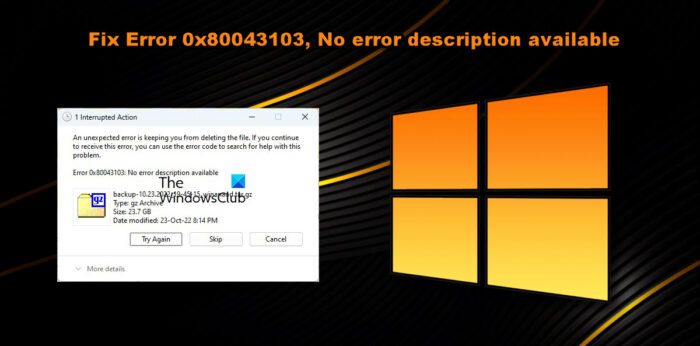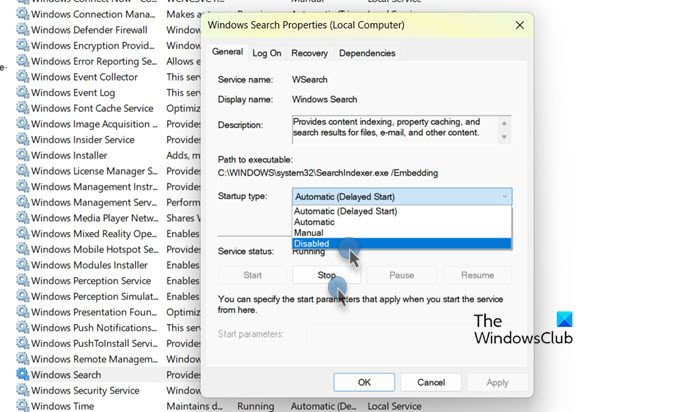Some users have reported that they are unable to delete some files from their computers. Whenever they try doing so, Error 0x80043103, No error description available, appears. The following is the exact error message users see.
An unexpected error is keeping you from deleting the file. If you continue to receive this error, you can use the error code to search for help with this problem. Error 0x80043103: No error description available.

What causes ‘Error 0x80043103, No error description available’?
Error 0x80043103 means that you are unable to delete a file. Usually, this is nothing but a glitch and can be resolved by just restarting the computer. You may also encounter this issue because of some misconfiguration in the registry. There are some other reasons and solutions that can execute to resolve the issue.
Error 0x80043103, No error description available
If you encounter Error 0x80043103, No error description available, follow the below solutions to resolve the issue.
- Restart and retry
- Move the file to a different location and try
- Disable Windows Search Service and then delete
- Use the PowerShell command to delete
- Temporarily disable the firewall
- Delete the file in Clean Boot or Safe Mode
Let us talk about each one of them in detail.
1] Restart and retry
First, we need to reboot the system and then retry deleting the files. Sometimes, the issue can be nothing but a glitch and can be easily resolved by restarting all the Windows services once again. After restarting, go to the same file you were trying to remove and delete it. Hopefully, this time, you won’t get any error messages.
2] Move the file to a different location and try
Next, let us move the file to a different location and then try to delete it. This may not be a solution but is a very common workaround that can be deployed. The reason why this would work is the lack of permission by the user to delete a file in that location or a bug. Either way, you will be able to delete the file or folder.
3] Disable Windows Search Service and then delete

Windows Search Service, at times, can overlap with the normal deletion process. This has been noted that sometimes stopping the service and deleting files can do the job for you. Also, there is no downside here as whenever we want, the Search service and be restarted. Now, to do the same, all you have to do is open the Services from the Start Menu, look for Windows Search, right-click on it, select Properties, select Disabled from the Startup option, and then click on the Stop button. After making all adjustments, restart your computer and then delete the file. Hopefully, this will do the job for you.
4] Use the PowerShell command to delete
If you get an error message while deleting a file or folder, there is a PowerShell command that you can use to delete it. This has worked for many victims and should work for you as well.
Open PowerShell as an administrator from the Start Menu. Then, execute the following command.
Remove-Item <path of the folder or file> -Recurse -Force
This might not delete all the files. In that case, restart your system and then run the command again. Hopefully, your issue will be resolved.
5] Temporarily disable the firewall
Sometimes, the firewall can be extra protective and stop you from deleting some files. In that case, you can disable it temporarily and then delete those files. If you have a third-party antivirus, go ahead and disable its firewall. If you are just using the Windows Defender Firewall, disable it using the subsequent steps.
- Open Control Panel.
- Go to Security & System > Windows Defender Firewall.
- Click on Turn Windows Defender Firewall on or off.
- Select Turn off Windows Defender Firewall for both Public and Private network settings.
Once you have disabled the firewall, check if the issue is resolved. Make sure to turn the antivirus or firewall on after deleting the files, as doing so will make your computer vulnerable to threats.
6] Delete the file in Clean Boot or Safe Mode
There is a possibility that a third-party app is conflicting with Windows services and stopping you from deleting a file. In that case, you should perform Clean Boot and then delete the file. If you can delete the file and want to know what was causing the issue, enable services manually to find out which app is the culprit. Once you know which app is the cause, either delete the app or disable the associated service. This will do the trick for you.
We hope that you can resolve the issue using the solutions mentioned in this post.
Read: How to delete undeletable & locked files, folders in Windows
Why does Connection keep timing Out?
Usually, if there is a dip in your bandwidth or something that has interfered with your connection, you will see an error message that says Connection time out. Some websites will say Connection time out due to security reasons if your computer goes into sleep mode during a session, you have to log back in to continue using that website.
Read: Fix Error 0x80070091 The directory is not empty
How do you fix an ERR connection?
ERR Connection Timed Out can be resolved by repairing the Internet connection. The user should first check the Internet speed. If the bandwidth is low, they should restart the router and then complain about this issue to their ISP. We also recommend you check our post if you see Connection Timed Out in Chrome.
Read: Unable to delete icons, files, or folders from Windows desktop.
Leave a Reply